Interview | 12 Feb 2025
Expert Interviews by FOODPathS – Rasa Pakeltienė, ICA
In our latest interview, we speak with Rasa Pakeltienė, Secretary General of the Association for European Life Science Universities (ICA). Rasa shares how ICA is in implementing sustainability initiatives across higher education and fostering cross-disciplinary collaboration and innovation among universities. Dive into the interview to learn how these efforts are shaping a more sustainable future for food systems. Enjoy the read!

ICA: Collective Power of European Universities for Global Competitiveness
Q: Can you tell us about the Association for European Life Science Universities (ICA) and why there was a need for such an initiative at the first place?
Rasa Pakeltienė: The Association for European Life Science Universities (ICA) serves as a vital network connecting over 50 universities across the European Higher Education Area (EHEA), all specializing in the circular bioeconomy, sustainable resource management, biodiversity, environmental protection, and rural development. ICA was established in 1988 to strengthen collaboration and enhance the global competitiveness of its member institutions by providing a platform for knowledge exchange, joint initiatives, and strategic partnerships.
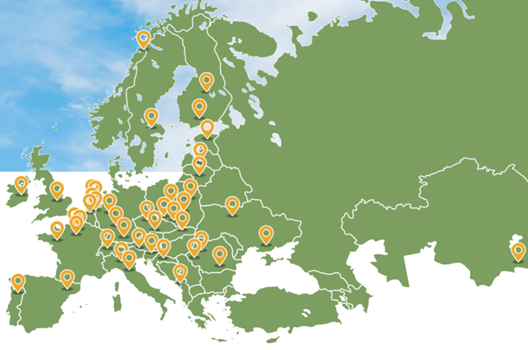
Under the guidance of the ICA Council, ICA coordinates 8 ICA Standing Committees, each dedicated to discipline-specific or cross-disciplinary collaboration, fostering innovation and synergy between universities. Moreover, ICA board is supported by 3 Board Committees (ICA European Committee, ICA Network for Innovation in Life Sciences Higher Education, and ICA Community of Practice for Bioeconomy Education), and Special Interest Group for Sustainable Entrepreneurship Education in the Life Sciences.
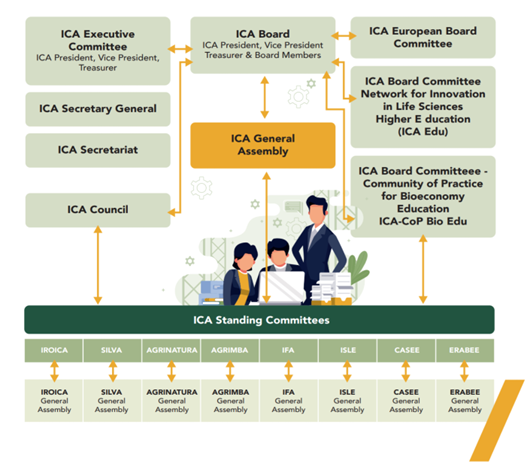
Additionally, ICA actively engages with European expert’s board and committees, other European and international networks, as well as student organizations, to further its impact on education, research, and policy in life sciences.
Membership is open to all European higher education institutions within the Bologna Process framework that focus on these critical areas, while universities outside of the EHEA can join as Associate Members.
The need for ICA arose from the growing competition among universities at both the European and global levels, making it essential to create a structured, cooperative environment where institutions can share expertise, collaborate on emerging challenges, and enhance the quality and international reach of their academic programs.
Driving Food Systems Transformation through Effective Collaborations
Q: What is the role of ICA for food systems transformation?
Rasa Pakeltienė: ICA plays a key role in transforming food systems by bringing together universities, researchers, and students to drive innovation, sustainability, and collaboration. As a broad network of European life science universities, ICA fosters interdisciplinary research and education in agriculture, food sciences, and sustainable resource management. Also, by connecting universities with industry, policymakers, and international organizations, ICA ensures that academic research and training align with real-world challenges like food security, climate change, and the circular bioeconomy.
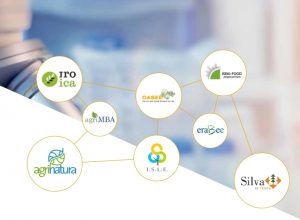
Through its Standing Committees and partnerships, ICA supports knowledge exchange, joint initiatives, and new ventures that promote sustainable food production, reduce waste, and improve resilience across the entire food value chain.
Additionally, ICA helps shape European food policies, aligns with global sustainability goals, and enhances international cooperation, ensuring that universities remain at the forefront of food system innovation.
Ultimately, ICA empowers the next generation of scientists and professionals to create a more sustainable, fair, and efficient food system.
Breaking Down the Silos
Q: Considering that the food systems is complex, multi-actoral and multi-sectorial: isn’t there the risk that life science universities work in silos/isolation? If yes, how do you address this challenge? If not, why?
Rasa Pakeltienė: That’s a valid concern, and traditionally, universities – especially those focused on specialized fields like life sciences – have tended to operate in silos. However, ICA actively works to break down these barriers by fostering cross-disciplinary collaboration and multi-actor engagement. Recognizing that food systems are complex, multi-sectoral, and involve diverse stakeholders – from farmers and policymakers to industry leaders and consumers – ICA ensures that life science universities don’t work in isolation.
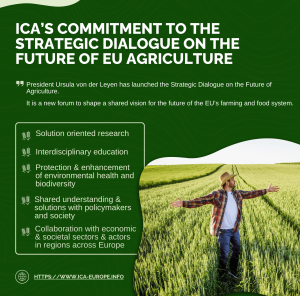
One of the keyways ICA achieves this is through its annual Rectors and Deans Forum, which serves as a premier platform for university senior leadership, academics, policymakers, and industry leaders to come together and discuss pressing challenges and opportunities in food systems and beyond. For example last year Forum focused on the “Strategic Dialogue on the European agriculture and forestry: implications for life science universities”. This forum not only strengthens collaboration between universities but also ensures that academic research and education remain relevant, informed by policy needs and industry trends.
Additionally, through its Standing Committees and networking initiatives, ICA fosters interdisciplinary research, bringing together experts from agriculture, food sciences, forestry, sustainability, economics, and social sciences. By encouraging joint projects, and policy dialogues, ICA ensures that universities actively contribute to real-world food system transformation rather than working in academic isolation.
In essence, while the risk of working in silos exists, ICA’s role is precisely to bridge these gaps, promote collaboration, evidence-based solutions and ensure that life science universities are at the forefront of shaping sustainable, resilient, and inclusive food systems.
Empowering Students: Innovative Education, Interdisciplinary Collaboration & Industry Engagement
Q: How do you support universities in preparing students and future professionals for the current food systems’ challenges?
Rasa Pakeltienė: ICA supports its member universities in preparing students and future professionals for today’s food system challenges by fostering innovative education, interdisciplinary collaboration, and strong industry engagement. It encourages universities to develop curricula that integrate agriculture, food sciences, sustainability, and socio-economic perspectives, ensuring students gain a holistic understanding of food systems. ICA also strengthens practical learning by connecting universities with industry leaders, policymakers, and researchers, offering students hands-on experiences.

A key part of this effort is the ICA Board Committees on Education, which plays a vital role in regularly organizing webinars, seminars, and workshops to enhance teaching approaches, share best practices, and equip educators with the latest knowledge and methodologies. These initiatives ensure that students benefit from cutting-edge insights and innovative learning experiences.
Through international networking initiatives, ICA and its committtees broadens students’ perspectives, equipping them with global insights into food security and sustainability. Additionally, by supporting research-driven education and innovation, ICA ensures that students are not only well-trained in technical expertise but also prepared to drive sustainable solutions in food systems. Furthermore, ICA helps universities cultivate future leaders who are ready to transform food systems into more sustainable, resilient, and inclusive models.
Central Role of Universities for Transforming Food Systems
Q: FOODPathS is defining an ideal model/prototype for a partnership to develop sustainable food systems. In your opinion, what are the key actors that you recommend to involve in such a model/prototype?
Rasa Pakeltienė: To develop truly sustainable food systems, a collaborative and multi-sectoral approach is essential, with universities and research institutions playing a central role. They drive innovation, conduct critical research, and educate future professionals who will lead the transformation of food systems.
Alongside them, the agri-food industry and SMEs bring practical and scalable solutions, while farmers and cooperatives ensure that innovations are grounded in real-world agricultural practices. Policymakers and government bodies shape the regulatory framework and align initiatives with EU strategies like the Green Deal and Farm to Fork Strategy, etc.
Meanwhile, consumers and civil society organizations create demand for sustainable products and advocate for ethical and inclusive food systems. Financial institutions and investors provide the funding needed to scale sustainable solutions, and international organizations offer global perspectives and policy alignment.
To sum up, by fostering strong collaboration between universities, industry, policymakers, and society, FOODPathS can build a holistic, inclusive, and impact-driven model that transforms food systems in a way that is both practical and forward-thinking, and accelerates the transformation of food systems.
Best Practices from ICA Members
Q: What are some good examples or projects that could serve as best practices for FOODPathS and FutureFoodS?
Rasa Pakeltienė: From the perspective of a life science universities network, several projects and initiatives stand out as best practices for FOODPathS and FutureFoodS, showcasing how universities can drive the transformation of food systems through research, education, and collaboration. For example, ICA member Wageningen University & Research leads in sustainable agriculture and food innovation, working closely with governments, businesses, and NGOs to address global food security challenges. Our other members AgroParisTech, BOKU and others focuses on agronomy, food science, and environmental sustainability, fostering interdisciplinary research and industry partnerships. Furthermore, Swedish University of Agricultural Sciences – SLU’s Sustainable Food Systems Master’s Program equips students with a systems-thinking approach to tackling food sustainability challenges.
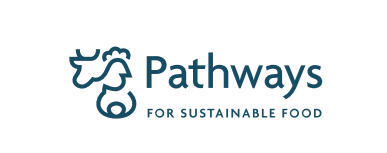
The Horizon Europe Funded project PATHWAYS, also coordinated by SLU facilitates multi-stakeholder engagement to co-develop strategies for sustainable livestock and food production. These, and similar initiatives demonstrate how life science universities collaborate across disciplines, regions, and sectors to build resilient, fair, and sustainable food systems, making them strong models for FOODPathS and FutureFoodS.
The Three Pillars of an Ideal Partnership
Q: What would be 3 keywords describing a future ideal partnership for sustainable food systems?
Rasa Pakeltienė: Three pillars – collaboration, innovation, and inclusivity – form the foundation for a successful and transformative partnership in shaping the future for systems.
The ideal partnership for sustainable food systems requires strong cooperation between universities, industry, policymakers, farmers, and civil society to develop real-world solutions. Innovation is key, using research, technology, and new approaches to make food systems more sustainable and resilient. At the same time, inclusivity ensures that all voices – from small-scale producers to global stakeholders – are heard and involved in shaping a fair and ethical food future.
To learn more about ICA check out their website here.
Follow #FOODPathS on social media for more updates.

